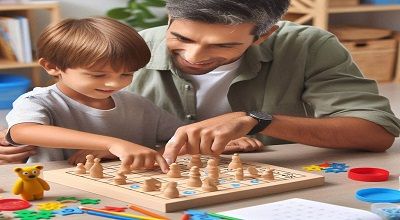Board Games
Using board games to teach math to young children is fun. And an effective way to help them develop essential math skills while enjoying themselves. Board games can make learning math engaging and interactive, helping kids grasp concepts and improve their problem-solving abilities.
Here are some tips and ideas for using board games to teach math to young children:
- Choose Age-Appropriate Games: Select board games that are suitable for your child’s age and skill level. Many board games are designed specifically to teach math concepts to children. And these can be a great starting point.
- Counting and Number Recognition: Games like Chutes and Ladders or Snakes. Ladders can help young children with counting and recognizing numbers. As they move their game pieces, they’ll practice counting and identifying numerals on the game board.
- Addition and Subtraction: Games like Uno, Monopoly Junior, or any board game. That involves dice that can help children practice addition and subtraction. Encourage them to calculate the sum or difference of the numbers they roll or draw in these games.
- Pattern Recognition: Games like Connect Four or Checkers can help children develop pattern recognition skills. Which are essential for understanding more advanced math concepts.
- Fractions and Percentages: Games like Pizza Fraction Fun or The Allowance Game can introduce young children to the concepts of fractions and percentages in a playful manner.
- Geometry and Spatial Awareness: Games like Blokus or Tangrams can help kids develop their spatial awareness and geometry skills. They manipulate pieces to fit into specific patterns or areas on the game board.
- Money and Budgeting: Monopies and games that involve money can teach children about basic financial concepts. Such as counting money, making changes, and budgeting.
More here…
- Problem Solving: Board games often require strategic thinking and problem-solving, which are essential math-related skills. Games like Rush Hour or Sudoku (in board game form) can be great for this purpose.
- Card Games: Traditional card games like Go Fish, Crazy Eights, and War can help children with number recognition, counting, and simple addition.
- Create Your Own Math Games: Encourage creativity by having your child invent their own math-related board game. This can be a great way to reinforce their understanding of math concepts and boost their critical thinking skills.
- Make Learning Fun: Emphasize the enjoyment of the game rather than the competition. Praise your child’s efforts and celebrate small victories to keep them motivated.
- Incorporate Math Talk: While playing, talk to your child about the math concepts they are using or learning. Ask questions like, “How many spaces do you need to move to reach the finish line Or “If you have three apples and you eat one, how many are left?”
- Real-World Applications: Connect the math concepts learned in the game to real-life situations. For example, if you play a money-related game. Discuss how those skills are used when shopping or saving money.
- Be Patient: Remember that children learn at their own pace, and it’s essential to be patient and supportive. Encourage them to explore and make mistakes as part of the learning process.
Summary
Using board games to teach math to young children can be a valuable tool for making math enjoyable and accessible. It fosters a positive attitude towards math and helps children develop essential mathematical skills. That will serve them well throughout their education and in everyday life.
